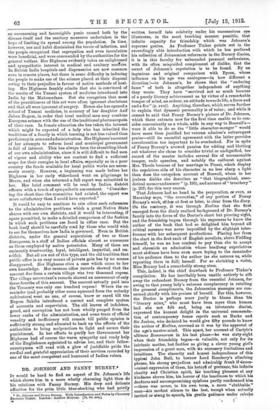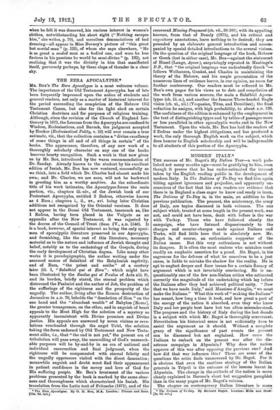DR. JOHNSON AND FANNY BURNEY.* IT would be hard to
find an aspect of Dr. Johnson's life which shows him in a more wholly charming light than do his relations with Fanny Burney. His deep and delicate affection for the prim little blue-stocking who had privily
• Dr. Johnson and Fanny Purism. With Introduction and Notes by Chauncey Tirewater Tinker. London: Andrew Nelrose, [7a. 6d, net.] sis - •
written herself into celebrity under his unconscious eye illustrates, in the most touching manner possible, that infinite capacity for friendship which was Johnson's supreme genius. As Professor Tinker points out in the exceedingly able introduction with which he has prefaced his collection of Johnsonian references in the Burney diaries, it is in this faculty for unbounded personal enthusiasm, with its often misguided complement of dislike, that the secret of Johnson's reputation is to be found. By an ingenious and original comparison with Byron, whose influence on his age was analogous—in how different a direction !—to Johnson's, he shows that the "enduring fame" of both is altogether independent of anything they wrote. They have "survived not so much because of a purely literary achievement as by virtue of a remarkable temper of mind, an ardour, an attitude towards life, a force and and a fire" (p. xxxi). Anything, therefore, which serves further to explain that dynamic personality is of value; and while it cannot be said that Fanny Burney's picture of Dr. Johnson, which these extracts now for the first time enable us to con- sider conveniently as a whole, adds in any way to Boswell's- were it able to do so the " little character-monger " would have more than justified her veteran admirer's extravagant praise—still its essential agreement with the latter provides corroboration too important to be overlooked. For in spite of Fanny Barney's avowed passion for editing and blotting out whatever she chose to consider trivial or undignified, her record of the master includes several fits of unreasonable temper, rude speeches, and notably the outburst against Mrs. Thrale because of her marriage to Piozzi, which display the capricious side of his character in no less sharp a light than does the outspoken account of Boswell, whom in her jealous dislike she describes as "that biographical, anec- dotical memorandummer " (p. 195), and accuses of " treachery" (p. 207) for this very reason.
That Johnson bad no hand in the preparation, or even, as Macaulay bays, "the correction," of any portion of Fanny Burney's work, either at first or later, is clear from the diary. On the contrary, it was through Beeline that she first emerged from the dimly realized background of Dr. Burney's family into the focus of the Doctor's short but piercing sight, and the friendship begun through his eagerness to know the author of the book that had so delighted him beyond all critical measure was never imperilled by the slightest inter. ference with her subsequent productions. Placing her from the start in the first rank of English novelists, above Fielding himself, he was no less content to pay than she to accept and chronicle an admiration whose headlong superlatives must at.times have been even more trying to the remainder of his audience than to the author (as she asdures us, while repeating them in full) herself. For so shrinking a violet, Miss Burney had a remarkably strong stem. •
This, indeed, is the chief drawback to Professor Tinker's compilation. He has inevitably been unable entirely to sift away the redundant Burney from the essential Johnson, for owing to that young lady's extreme complacency in retailing the grossest .compliments, the Johnsonian passages are con- cerned chiefly with his praises of herself. For this, however, the Doctor is perhaps more justly to blame than his "literary minx," who must 'have been more than human had she not felt and, being an inveterate diarist, expressed the keenest delight in the universal commenda- tion. of contemporary beaux esprils such as Burke and Sir Joshua, who declared he would give fifty pounds to know the author of Beeline, crowned as it was by the approval of the age's master-mind. This apart, her account of Carlyle's ultintne Romani:mem in his last phase—be was sixty-eight when their friendship began—is valuable, not only for its intrinsic matter, but further as giving a clever young girl's impression of a great man, with its neoeseary limitations and intuitions. The sincerity and honest independence of this typical John Bull, to borrow Lord Rosebery's clinching phrase, his strong prejudices and admirably -frank if -incon- venient expression of them, his hatrel of pretence, -his infinite charity and Christian spirit, his touching pleasure at any kindness shown him, his horror of the loneliness to which his deafness and uncompromising opinions partly condemned him —there was never, in •his own term, a more "clubbable" man—his modest silence to the last, nxcept when actually invited or stung to speech, his gentle patience under rebuke when he felt it was deserved, his curious interest in women's clothes, notwithstanding his short sight (" Nothing escapes him," she writes, p. 70), and merciless denunciations of bad dressing—all appear in Miss Burney's picture of "this great but mortal man" (p. 125), of whom she says elsewhere, " He is as great a souled man as a bodied one, and were he less furious in his passions he would be semi-divine" (p. 132), not realizing that it was the divinity in him that manifested itself, perversely perhaps, by these claps of thunder in a clear sky.







































 Previous page
Previous page